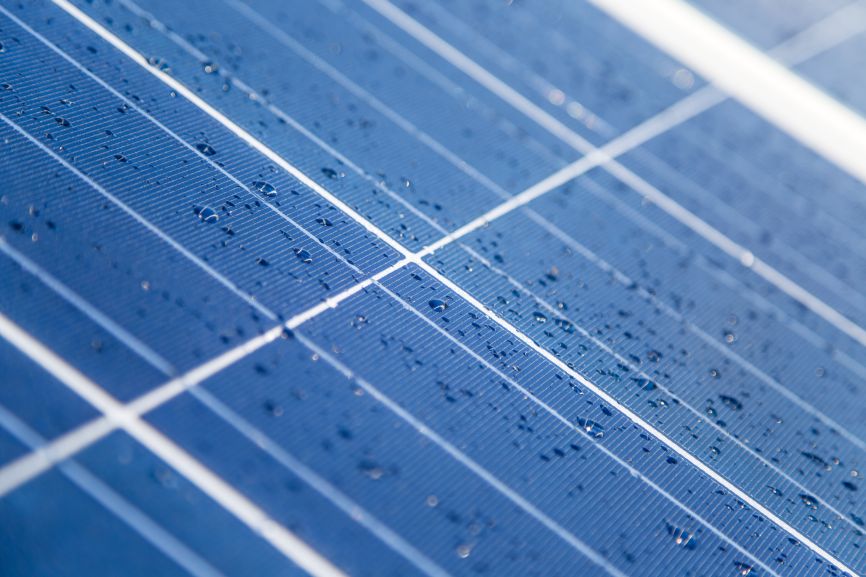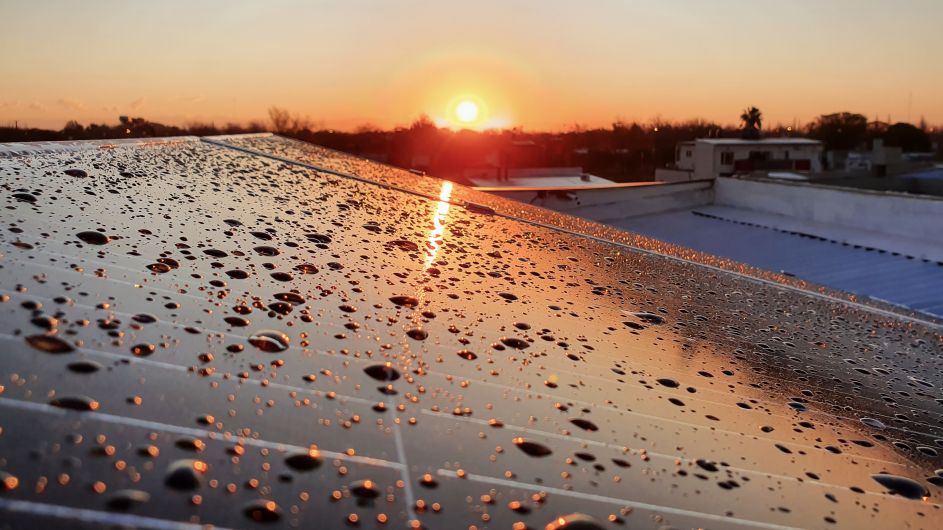If you’re thinking about going solar, one of the first questions that comes to mind is: “Are solar panels water resistant?” After all, they’ll be sitting on your roof 24/7 — rain, shine, or storm. The short answer: yes, solar panels are water resistant — but they aren’t completely waterproof.
Here’s the difference: waterproof means a product can be submerged in water without issue, while water resistant means it’s built to withstand exposure to rain, snow, and humidity without damage. Modern solar panels are engineered with multiple protective layers and carry IP (Ingress Protection) ratings like IP65, IP67, or IP68, which tell you exactly how resistant they are to dust and water.
This durability is one of the biggest reasons homeowners across Dallas and beyond trust solar panels to last for decades. And when installed correctly, they don’t just survive bad weather — they thrive in it, quietly converting sunlight into savings year after year.
How Solar Panels Are Built to Resist Water

When you invest in solar, you’re not just getting a shiny piece of glass bolted to your roof. You’re getting a carefully engineered system designed to fight off the elements. Let’s break it down.
At the very top sits a sheet of tempered glass — tough enough to handle rain, snow, and even the occasional hailstorm. Beneath that, layers of encapsulation seal the solar cells in place, protecting them from moisture and keeping performance consistent year after year. The backsheet adds another waterproofing layer from below, while a sturdy aluminum frame keeps the entire panel rigid and secure, no matter what the weather throws at it.
But manufacturers don’t stop there. Each panel comes with a junction box, safely sealed to block water intrusion where the electrical connections live. High-quality connectors are designed to remain watertight, ensuring no weak spots where water could sneak in.
All of this engineering serves one purpose: peace of mind. Whether it’s pouring rain in spring, snow piling up in winter, or humid summer air, your panels are built to shrug it off and keep producing clean, reliable energy.
Understanding IP Ratings for Solar Panels
When it comes to water resistance, manufacturers don’t just make bold claims — they back them up with something called an IP rating, short for Ingress Protection. This global standard tells you exactly how dust- and water-resistant a product is, using two numbers: the first for dust, the second for water.
For solar panels, you’ll usually see ratings like IP65, IP67, or IP68. Here’s what they mean in plain English:
- IP65 – Resistant to dust and protected against water jets from any direction. Think heavy rain or a pressure washer at a distance.
- IP67 – Completely dust-tight and safe against temporary immersion in water (up to 30 minutes at around 1 meter deep).
- IP68 – Dustproof and capable of handling continuous immersion in water, depending on manufacturer specs.
Now, here’s the important part: most rooftop solar panels are not designed to sit underwater — that’s where the distinction comes in. They are water resistant, not waterproof. In other words, they can easily survive decades of rain, storms, and snow without issue, but you wouldn’t want to sink them in a swimming pool.
This rating system is your guarantee that your solar panels are more than ready to handle Mother Nature — and keep your home powered rain or shine.
Do Rain and Weather Affect Solar Panels?
One of the biggest myths about solar panels is that rain or snow will ruin them. The truth? Rain is actually your panels’ best friend. Instead of harming them, it often washes away dust, pollen, and debris that block sunlight, helping your system perform more efficiently.
But what about the big stuff — storms, hurricanes, or hail? Today’s solar panels are designed and tested to handle extreme weather. High-quality panels are built to resist heavy winds, withstand hail impact, and keep producing even in tough climates. In fact, many states require panels to meet strict building and safety codes before they can be sold, so homeowners have added peace of mind.
Snow and freezing temperatures? Not a problem. The tempered glass surface and water-resistant design ensure that melting snow drains away without causing damage. Panels even operate more efficiently in cooler weather, so you may see surprising output on crisp winter days.
And here’s the kicker: most manufacturers back this resilience with solid warranties. That means if weather-related issues ever do occur, you’re not left footing the bill.
Simply put: from rain showers to snowstorms, your solar panels are built to stand tall — and keep delivering savings no matter the season.
Can Solar Panels Get Water Damage?
While solar panels are designed to resist the elements, no system is completely invincible. In rare cases, water damage can occur — usually because of external issues rather than the panels themselves.
For example, tiny microcracks in the glass (often caused by falling branches, debris, or poor handling) can allow moisture to creep in over time. Likewise, faulty seals during manufacturing or sloppy installation can leave weak points where water finds its way inside. The most vulnerable areas? The junction box and connectors — if these aren’t properly sealed, water intrusion can compromise your system’s performance.
How do you know if water damage has happened? Look for signs like:
- A sudden drop in energy output without another clear cause.
- Visible condensation or moisture inside the glass layers.
- Dark spots or discoloration on the panel’s surface.
The good news? These cases are uncommon, and most reputable panels carry long warranties that cover defects and premature failures. With proper installation and regular maintenance, the chance of serious water damage remains extremely low. First Solar Installers can connect you with pre-vetted high-quality solar panel installers in your area. We work with installers that offer solar warranties. Get your quote now.
In short, solar panels aren’t just water resistant by design — they’re also backed by safeguards that protect your investment.
How to Prevent Water Damage to Solar Panels

The best way to protect your solar investment isn’t hoping your panels will last — it’s making sure they’re installed and maintained the right way from day one.
It starts with professional installation. Certified installers know how to properly seal junction boxes, tighten connectors, and position panels so they’re watertight and storm-ready. Cutting corners here can lead to costly issues later, so this is one area where experience truly pays off.
Next is quality mounting and tilt angle. A secure frame and the correct pitch allow water, snow, and debris to naturally slide off your panels. This prevents pooling, which is one of the biggest threats to long-term durability.
Regular inspections and maintenance are also key. A quick annual check can spot small cracks, worn seals, or loose fittings before they turn into bigger problems. Think of it like a checkup for your home’s energy system.
And finally — don’t overlook warranties and certifications. Choosing panels with strong manufacturer warranties and proven IP ratings gives you peace of mind that your system is built to handle the elements for decades.
Bottom line? With the right team and proactive care, water damage doesn’t stand a chance. Work with a reliable solar installer today, call us to find out more.
What to Look for When Buying Water-Resistant Solar Panels
Not all solar panels are created equal. If you want true durability, you need to know what to look for before you buy. Here are the essentials every homeowner should demand:
- IP Rating of at Least IP65 – This ensures your panels can withstand heavy rain and water jets without issue. Anything less, and you may be compromising long-term performance.
- Reliable Encapsulation and Sealing – Quality panels use multiple layers of encapsulation to lock out moisture and protect the delicate solar cells inside.
- Strong Frame and Mounting Design – A sturdy aluminum frame and professional mounting system not only resist corrosion but also help panels shed water, snow, and debris naturally.
- Warranty Length – Look for at least 20–25 years of coverage. This shows the manufacturer stands behind their product’s durability in real-world conditions.
- Trusted Installation Support – Even the best panel can fail if installed incorrectly. Partnering with certified, local installers ensures your system is set up to perform for decades.
Choosing panels with these features means you’re not just buying power for today — you’re investing in a system that resists water, fights the elements, and saves you money for the long haul.
FAQs About Water Resistance of Solar Panels
Are all solar panels waterproof or just resistant?
Most solar panels are water resistant, not fully waterproof. That means they’re designed to handle decades of rain, snow, and humidity but aren’t meant to be submerged underwater.
What happens if moisture gets inside a solar panel?
If water seeps in through a crack or faulty seal, it can lower efficiency or damage internal components. Signs include visible condensation or sudden drops in output. Luckily, this is rare and usually covered by warranties.
Can solar panels survive hurricanes or flooding?
High-quality panels are tested against strong winds and hail. While no system is indestructible, many installations in storm-prone regions hold up well. Flooding, however, is different — panels aren’t meant to be underwater, but the mounting and angle often keep them safe above rising water levels.
Will rain reduce my solar output?
Yes, during heavy rain you’ll see less sunlight and lower output. But rain also cleans your panels, washing away dirt and dust. After a storm, production often improves.
Do portable solar panels have the same water resistance?
Portable panels also come with IP ratings, usually IP65–IP68. They’re fine for camping in the rain or humid conditions but should never be left sitting in standing water.
Conclusion – Water Resistance & Your Solar Investment
Solar panels aren’t fragile gadgets that crumble at the first drop of rain — they’re engineered to thrive in the elements. From rainstorms and snow to hail and humidity, modern panels are built with multiple protective layers, strong frames, and industry-backed IP ratings to keep water out and performance high.
That level of water resistance translates into longevity and peace of mind. When you choose quality panels and trusted installation, you’re investing in decades of reliable, weatherproof energy savings for your home.
Thinking of installing solar? First Solar Installers connects you with trusted, certified local professionals who ensure your panels are installed for maximum durability. Get Your Free Quote Today or Call us today.